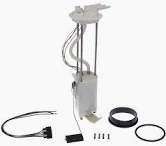Also, there are numerous reasons why an electric fuel pump can fail which knowing will protect you from future costly repairs. The most common reason of course is the running out of fuel, or trying to drive a car in which there id nothing left sadly this really leads only rotten gas into your engine. RepairPal says that simply running the tank to below a quarter-full accounts for about 25% of electric fuel pump failures. The pump rides in fuel for cooling and when you run out of gas the engine rips through these internal components. This causes the pump to overheat, severely decreasing both its efficiency and longevity, usually wearing out before it's 100K-150K mile expectation.
The fuel contamination is another major cause. The pumps internal mechanisms can be damaged by dirt, debris or water in the fuel. Consumer Reports reported that as many as 10% of fuel pump failures stem from junk clogging the internals from inside the tank or in line between it and motor, thus reducing flow but putting more heat on a servo's innards. These would corrode the parts of the pump, lowering operational efficiency and causing out-of-the-blue breakdown.
Most fuel pump failures are blamed on electrical problems. As Automotive News points out, about 15% of failures are due to wiring or relay issues. A shaking or rattling pump is not operational, and intermittent operations are caused by poor connections or damaged wiring that result in inconsistent power to the motor. Voltage fluctuations affect the performance of the pump, and so it works poorly — this over time burns out motor.

Aging is another factor. A majority of electric fuel pump units have a lifespan of about 100k miles, however due to it being in the tank and having to push against old, bad gas leaking from all sides can wear out quickly. According to Edmunds, approximately 20% of all vehicles end up needing a new fuel pump at around the 100k-mile mark. Over time, the components inside of a pump (like an impeller or diaphragm) can wear out with age and that loss may result in fuel pressure. It is especially prevalent with older vehicles where maintenance has been neglected or fuel filters never replaced.
Failing to replace old fuel filters before running a new pump is another reason why the pumps fail. A clogged or damaged filter will also cause the pump to have to work harder, which over time can lead it running too hot and failing. Car and Driver points out that replacing the fuel filter every 30,000 to 40,000 miles will ease strain on the motor (and improve overall system efficiency), hopefully extending pump life.
After that, I have had them last a couple months before one goes again or we find out it was just the crappy aftermarket pumps are what is causing the failures. Forbes article showing that roughly 10% of fuel pump failures are caused by replacement parts being used which meet too low an OEM standard. Particularly high load or prolonged fast driving may cause the pump to collapse prematurely. It is important to use top quality stuffs so that the pump does not fail long before its time.
These causes of fuel pump failures should help you to understand the root cause faster, and they can tell you what needs addressing when there is a fueling issue in your vehicle. Acquiring dependable units such as this Electric Fuel Pump guarantees a reliable long-term solution that meets all tougher performance requirements of present-day cars.